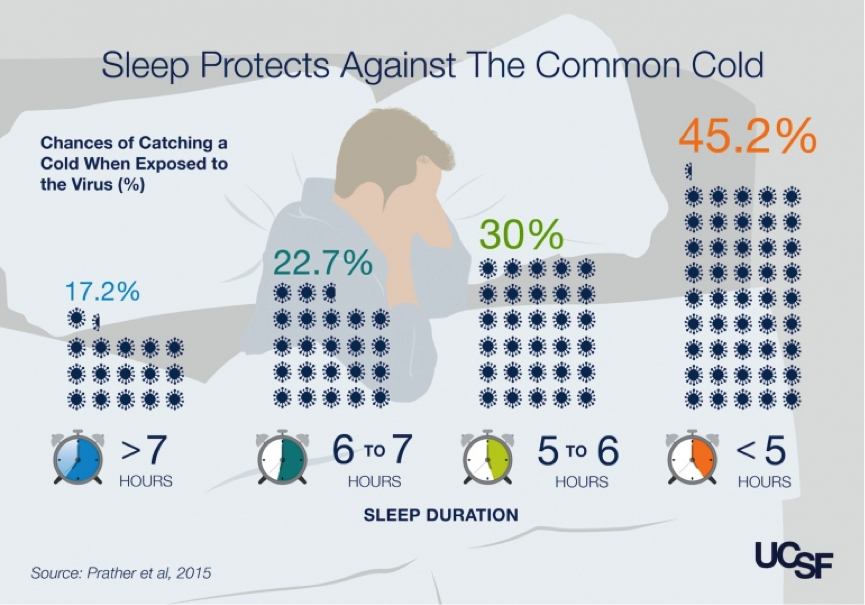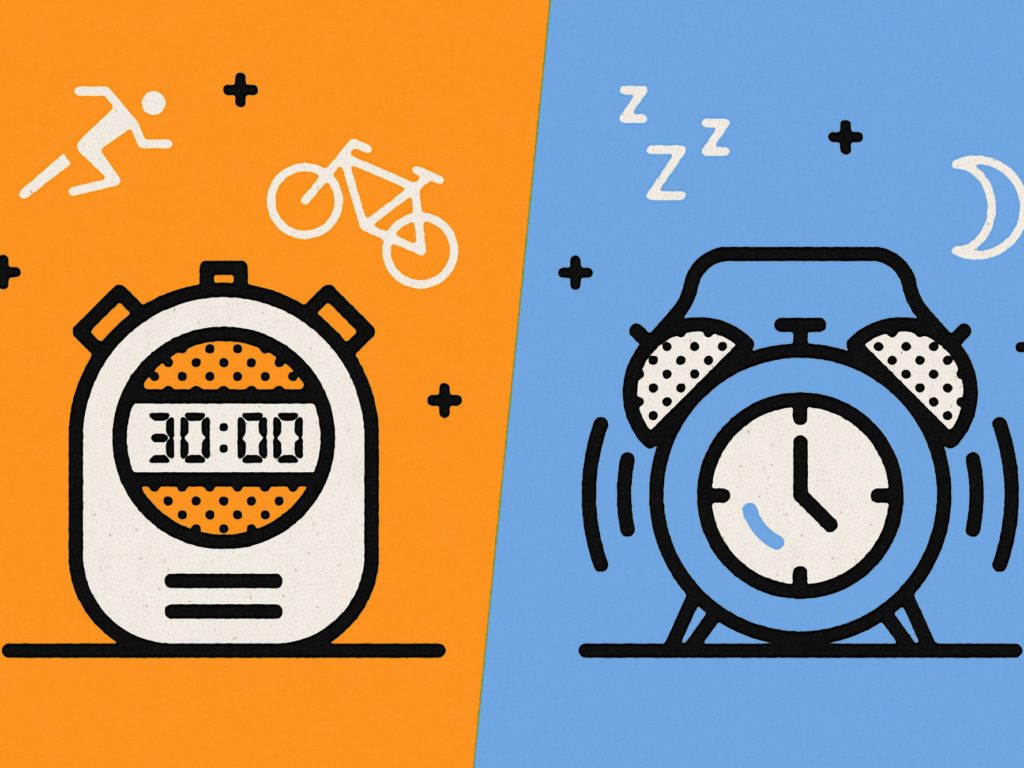Lots of training mantras emphasize the necessity of hard work and consistently setting time aside to train, practice, lift, and so on…
And that’s certainly true, to an extent. Deliberate and effortful practice is imperative for improving performance, regardless of the activity of choice — but it’s not the only facet to well-rounded training, either.
What tends to happen is that factors beyond the physical labor of training tend to get pushed to the sideline. Aspects like nutrition, stress management, and sufficient recovery often don’t receive as much time or attention because they aren’t always directly associated with a training plan.
Which is extremely unfortunate; even if you spend ample time training, neglecting these additional variables can greatly undermine your ability to progress through training plans or improve performance.
And one of the most overlooked aspects is prioritizing a healthy sleep schedule.
It’s probably something you’ve heard before, and there’s a reason it bears so much repetition: a sustainable training program must include a sleep regimen as effective (and consistent) as the training itself.
Impact of Sleep on Health
Many societies have adopted the subconscious mentality that hard work and dedication requires sacrifice in other areas. And, more often than not, that winds up being our sleep. (Ever catch yourself thinking there’s not enough time in the day? Or being proud of pulling an all-nighter?)
It’s estimated that 90% of sleep issues are left undiagnosed; and, within the US alone, there is an estimated cost of about $100 billion worth of health costs, fatigue- and sleep-related accidents, and missed work time as a result of unchecked sleep disorders and disturbances. This undoubtedly proves how the “hard work paradigm” can overshadow our need for healthy habits on a national scale.
And while we can’t necessarily implement healthier sleep behavior on a nationwide scale right away, as healthcare providers, we believe in making this information available and accessible to those within our communities.
So, let’s review some of the most prominent reasons why sleep is such a vital facet to healthy living, shall we?
Sleep and the Immune System
This is probably one of the more obvious connections many of us know to some degree; if anyone’s ever told you to get a good night’s rest to stave off a cold, it’s because of the science correlating solid sleep hygiene with stronger immunity. Plenty of research has proven how insufficient sleep impacts the body’s ability to produce antibodies.
One study specifically tested how varying sleep volumes would affect antibody production before receiving a hepatitis B vaccination. Some participants were enjoying the standard 7-8 hours of sleep per night through the week before getting vaccinated, whereas the remaining participants were restricted to only 5 hours of sleep per night.
Perhaps just a 2-3 hour difference doesn’t sound like much, but the results say otherwise… The participants with restricted sleep times yielded a 50% reduction in antibody production compared to those with sufficient sleep. Even though the participants were allowed to sleep as much as they desired after being vaccinated, they still struggled with limited antibodies without enough sleep beforehand.

Another similar study experimented with the effects of sleep volume before exposing participants to rhinovirus (otherwise known as the common cold). Of the participants who maintained 7-8 hours of sleep beforehand, only 20% of them had experienced symptoms. Compare that to those who had slept for 5 hours or less, where 50% of these individuals had actually contracted the sickness after exposure.
These studies (along with many others) are indicative of how much of our adaptive immune system is most active during sleep. Our adaptive immune system is what helps our bodies build antibody defenses in reaction to viral or bacterial exposure. (So the next time someone tells you to get plenty of rest when you feel that scratchy throat sneaking up on you, make sure you follow through.)
Sleep and Hormone Production
Based on the correlation between sleep and immunity, we can already infer that our bodies are anything but inactive during a good night’s rest — and the same applies to metabolic and hormonal changes, too.
A lack of sleep results in increased secretion of cortisol (a stress hormone that increases blood sugar) and ghrelin, which is a hunger hormone that increases cravings for simple carbohydrates. Plus, insufficient sleep is associated with increased heart rate and blood pressure as well, meaning poor sleep hygiene can interfere quite a bit with maintaining nutrition goals or mitigating excessive cravings.
On top of that, how well you sleep also plays a heavy hand in the production of hormones critical for building proteins found in muscles, joints, tendons, and ligaments. Without enough sleep to produce testosterone or growth hormone, these anatomical structures will have to endure the heavy training loads without proper protein to keep them strong and functional. (And that, dear reader, is a recipe for overtraining injuries, excessive fatigue, and stagnation of training improvements.)
Sleep and Mental Health
In addition to all the physical and physiological effects, sleep dysfunction is also heavily correlated with mental health struggles and disorders.
For clarification, abnormal sleeping patterns are not the immediate cause for mental health concerns (or vice versa), but there is ample evidence to show that sleep-related interventions can largely result in a reduction of mental illness symptoms. Some intervention examples can include improvements in sleep hygiene and education, or cognitive behavior therapy for insomnia.

But don’t get us wrong — when we talk about mental health, we aren’t strictly referring to specific disorders or illnesses. (Not everyone has a mental health illness, but everyone has mental health, so no one is exempt from sticking to a steady sleep schedule!)
Impact of Sleep on Training and Performance
Now that we’ve reviewed a general idea of what a proper night’s sleep (or lack thereof) can entail, you can imagine why it’s doubly as important in the context of your training.
It can be an especially impactful factor when it comes to that deliberate practice people often emphasize. If you intend on progressing your training, your body (and mind!) needs to be well-rested to take on the demands of consistent exercise or increased workloads.
Otherwise, your mind and body are bound to face a few consequences.
Sleep and Lack of Focus (Microsleeps)
Most people are probably familiar with this concept: it’s like that feeling you get when you didn’t catch quite enough z’s the previous night and need an extra caffeine kick to get through the day.
Sometimes referred to as “microsleeps” or “brain fog,” these momentary, unfocused periods of time can be a surprisingly impactful disruption in an otherwise productive workout session. It could be as simple as just feeling slightly distracted, or it could be intense enough to cause difficulty with staying present. (And sometimes, people aren’t even fully aware of how out of it they are.)

One study decided to assess these little “brain blips” by assigning a mundane sorting task to several participants. They were prompted to perform these mundane tasks several times over the course of several weeks, with different groups functioning on varied amounts of sleep per night. As you might be able to guess, the individuals prescribed with 7-9 hours of sleep performed the best, both in accuracy and speed for sorting.
However, with those that were sleep deprived, the researchers reported consistent patterns of brief inattention throughout the week. And it was more than just losing focus; these individuals, at one point or another, zoned out enough where they completely stopped responding to the task. These unfocused instances were soon given the title of “microsleeps,” as the researchers theorized that a sleep-deprived brain will prioritize sleep even during awake periods.
What’s more is that the daunting consequences don’t stop there. The same study also determined that the individuals who only slept 6 hours for 10 days straight had performed just as poorly as an individual who didn’t sleep for a full 24 hours. This implies that sleep deprivation persists further than just 1 or 2 nights; it can have a cumulative effect on your cognitive awareness and attention and just trying to “make up for lost sleep” by sleeping later on the weekends isn’t going to cut it.
Now, put this into the context of anything less mundane, and there can be some pretty serious implications. Consider a trail run — a poorly timed instance of “microsleep” could result in a misstep, potentially leading to a sprained ankle or a fall. The same could apply to any kind of workout: weightlifting, plyometric jumps, cycling, practicing agility… the list goes on.
Sleep and Memory Function
In a similar line of thought, adequate sleep duration and quality is also essential for our brains to process short-term memories into long-term memory.
Alright, that’s an oversimplification of how our brains store memory… but there’s only so much we can include in one article.
Here’s the basic gist of it all: because we have access to advanced technology like electroencephalogram (EEG) and functional MRI (fMRI), researchers can observe the areas of our brain activity during particular sleep stages, as well as how active these areas are.
Typically, there is heightened activity in certain parts of the brain during the early (non-REM) stages of sleep that suggests the non-REM phases are an optimal time to consolidate short-term memories into long-term memory. Additional, experimental research has also shown that individuals who took a nap after learning a new activity demonstrated a 20% improvement in performance when they performed the activity a second time.

But sleep doesn’t just make it easier for us to remember things for a longer period of time; it also improves our brains’ procedural memory (otherwise referred to as our motor skills). And that’s something that athletes should absolutely not take for granted!
In terms of training, consistently making progress and adapting to movement changes requires the creation of new neuromotor pathways. In one study, 2 groups of participants were monitored for accuracy and speed in learning a novel keyboard task. The first group was prompted to learn the task, resume their day as normal, and then return to repeat the task for a second session. The other group, however, was prompted to sleep between both practice sessions — and lo and behold, the results were astounding.
Although both groups had the same amount of down time between the first and second sessions, the group that had slept demonstrated a 20% improvement in speed and a 35% improvement in accuracy compared to the other participants. What’s even more interesting is that the group who didn’t sleep were only able to catch up to the same accuracy and speed after having a night of rest themselves.
That’s some pretty hearty food for thought, huh?
In short (…or long), individuals should prioritize a healthy and sustainable sleep schedule to best maximize the process for learning and solidifying new motor skills. (Which you can imagine, would be especially helpful for physical activity and training!)
Sleep and Sports Performance
Unsurprisingly, as we unpack many of the layers behind sleep and its impactful presence on functioning and learning, we can infer that sleep is also crucial for optimal athletic performance.
Sleep obviously isn’t the only variable that affects an athlete’s performance, but it’s often correlated with significant factors like time to exhaustion, risk of injury, and perception of pain — all of which can create dreaded, long-lasting consequences if left unchecked.

Adolescent athletes who sleep 5 hours or less before a competition face a massive increase in injury risk: over a 70% likelihood of sustaining injury. And with sleep deprivation, these young athletes are susceptible to a 10-30% reduction in time to physical exhaustion, resulting in a much earlier onset of fatigue.
Similarly, there is also a reduction in the body’s ability to accurately perceive and respond to pain without a healthy sleep schedule. With adequate rest, your body is able to utilize top-down inhibition, which is the system that allows your body to accurately perceive sensations of pain and respond accordingly. Decreasing sleep by as little as 2 hours can result in a heightened response to pain, preventing your brain from properly assessing the sensation and likely causing a more severe response than is necessary.
Sleep Tight, Fellow Athletes
And there you have it: a comprehensive (though far from exhaustive) breakdown of why sleep matters, both in life and in training.
There is plenty more depth to explore when it comes to understanding how sleep works, and even more behind the true benefits beyond feeling well-rested and ready to take on the day. Hopefully, though, you’re inspired to revisit your own sleep habits and appreciate the myriad of ways in which sleep helps you regulate essential biological, cognitive, and psychological functions.

